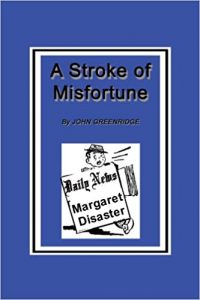 A Stroke of Misfortune is a self-published book by the husband and carer of a stroke survivor. It is a truly authentic account in that it is the unedited thoughts of John Greenridge, an older professional man who is looking after Margaret, his wife of fifty years, after she fell causing a haemorrhagic brain injury.
A Stroke of Misfortune is a self-published book by the husband and carer of a stroke survivor. It is a truly authentic account in that it is the unedited thoughts of John Greenridge, an older professional man who is looking after Margaret, his wife of fifty years, after she fell causing a haemorrhagic brain injury.
The down-sides are many. It is poorly-written, and has not been edited. There are misprints and ambiguous sentences. There are unnecessary repetitions. The story diverges onto the author’s resentments about today’s NHS. The language is sexist and ageist in places. There is copious detail (repeated) about the Cardiff city centre’s lack of maintenance that Greenridge holds responsible for his wife’s accident. There is an overlong digression on his disagreements with a medical report drawn up as part of the process to assess for compensation. But despite his weaknesses as an author, Greenridge gives a very full picture of how he devoted himself to assisting his wife Margaret to recover from her stroke. The very short-comings of the narrative give it some validity as the personal perspective of a caregiver.
John is a capable man, although he rather proudly informs us of his lack of skill in cooking and other household responsibilities. (We hear a little too much what he has to eat.) He has a strong sense of duty to look after and protect his wife, and to facilitate her recovery. What emerges very strongly from this account is the importance of continued input and effort to practise lost skills – repetition for neuroplastic change – in an atmosphere of consideration and friendship. John emphasises Margaret’s own determination, and the encouragement of both himself and many friends, to enable her to regain language and communication, household skills and driving. Although Margaret has some initial difficulties walking, getting tangled between left and right feet, she soon recovers her motor abilities. But cognitively, there are many problems. From being a highly competent person who is prominent in the local church groups, doing floral arrangements and gardening, Margaret is unable to find the language for conversation and loses the thread of what others say. Memory is a big problem. She cannot follow the plot lines of TV programmes. She also loses numerical skills, and is no longer able to do simple addition.
John Greenridge shows a partial awareness of his tendency to take over in his protective care for his wife. He maintains a persistent regime of daily verbal and linguistic exercises to help Margaret’s recall of language, along the lines of that given to Roald Dahl’s wife Patricia Neal. (He refers several times to the film about Patricia Neal, but not to A Stroke in the Family in which Valerie Eaton Griffith described the exercises she used with Neal.) He is however very careful to give Margaret rests, and to work only when she feels up to it – the rehab needs to be fun. He notes when the Speech Therapists ask him to sit out and not interfere with her sessions, realising that this means he is intervening too much. But he is also touchingly aware of Margaret’s improvements, noting when she starts to pick up on his puns, to take the initiative in some decision-making, and to become more independent. He knows he will have to step back. He tells us that after a while Margaret has managed independent trips to Leeds for the international piano competition, successfully returning to old passions.
Margaret’s view of all this is missing – even an afterword to give an impression of her perspective in retrospect would have been useful in this regard. (In the aphasia literature there is on-going discussion about the divergent opinions and understandings of people with aphasia and their family caregivers. One view is that these divergences may in part result from the caregivers’ strategy to keep to themselves the extent of the burdens they take on, and the perceptions of how they are managing (see Gillespie, Murphy and Place 2010).) John hints at some periods of low mood, and describes his hectic schedule with consequent lack of sleep, as he tries to keep up a business while helping Margaret to recover. But he is neither reflective nor open enough to contribute much to that debate.
A Stroke of Misfortune is an interesting story, although rather self-indulgent in the telling, but it could have been much more.
Greenridge, John (2010) A Stroke of Misfortune, Milton Keynes UK, AuthorHouse
Gillespie A., Murphy J., and Place M., (2010) Divergences of perspective between people with aphasia and their family caregivers, Aphasiology 24 (12), 1559-1575